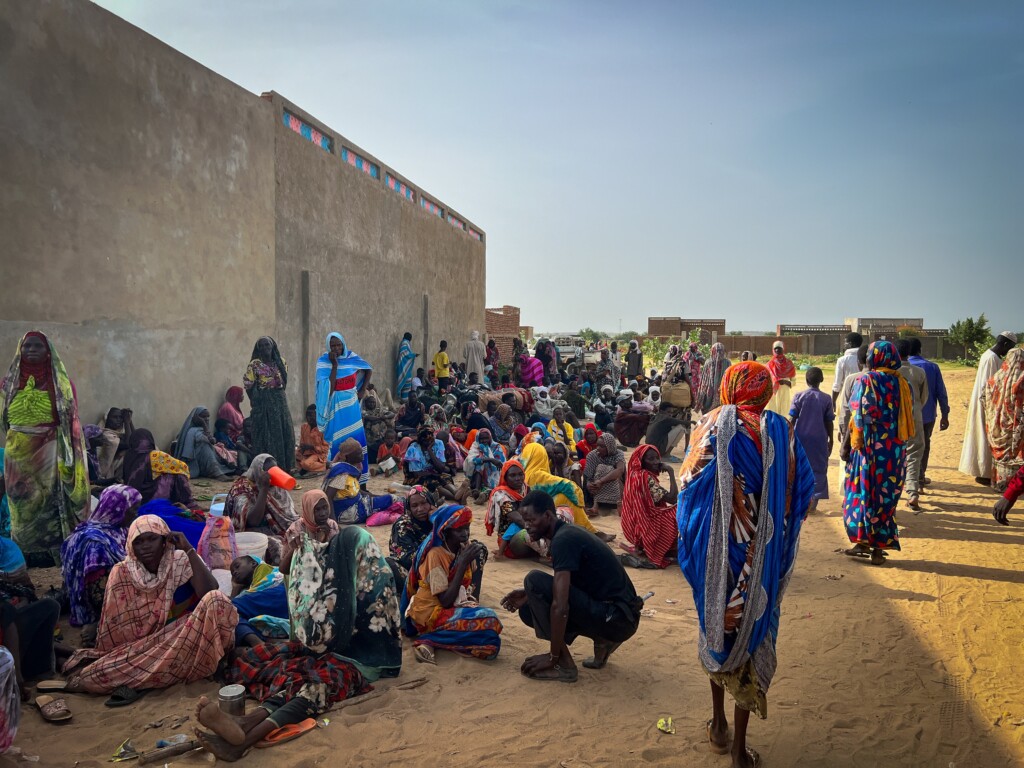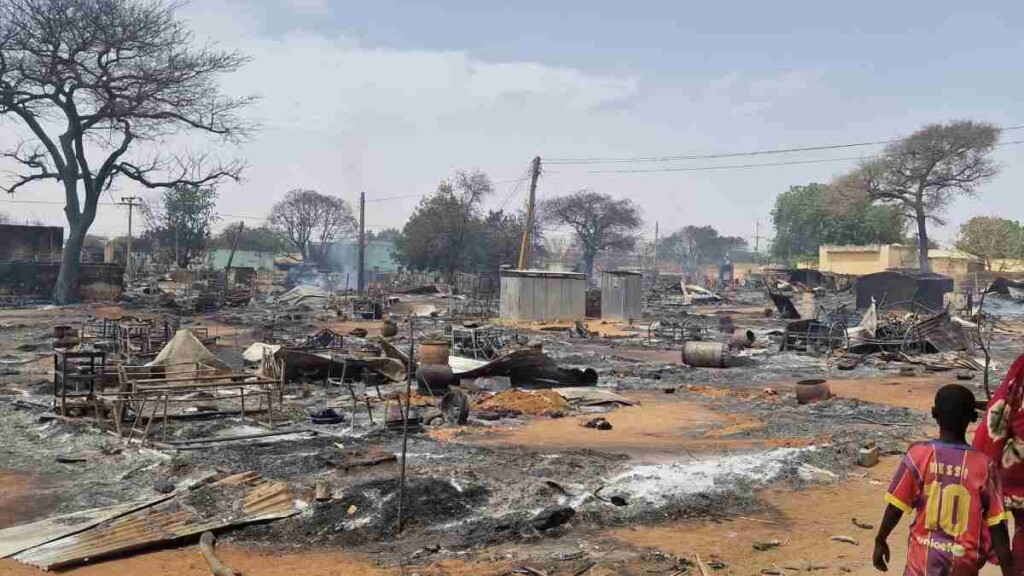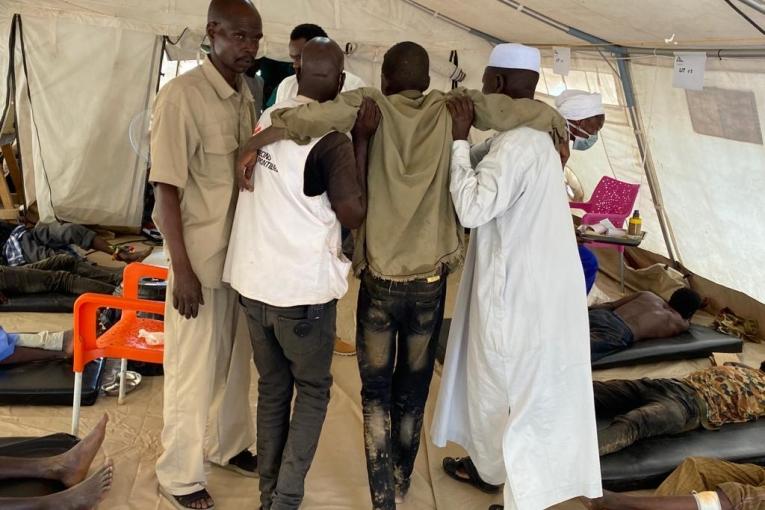Horrifying testimonies on West Darfur ethnic targeting as other Masalit Sultan relative is killed

Thousands of refugees from El Geneina, West Darfur, arrived in André, Chad (Photo: MSF France)
ADRÉ / EL GENEINA – June 19, 2023
Survivors of the ongoing attacks in El Geneina, capital of West Darfur, are giving shocking testimonies of the widespread abuses against civilians, especially Masalit tribe members. The Darfur Bar Association (DBA) reported the killing of Amir Badawi Bahreldin, cousin of the Masalit sultan, in an attack on his home in El Geneina as civil society notables in the town are targeted.
In a statement yesterday, the DBA said that the sultan’s family and other notables of El Geneina’s civil society were targeted with arbitrary killing.
The statement also referred to the killing of Amir Tarig, brother of Sultan Sa’ad Bahreldin, and his cousin, Amir Abubakar Tajeldin, a week ago. At least 16 people were killed on that day.
The DBA said it had also received news from several sources that one of its founders was killed in West Darfur and so was the former head of the Kerending Crimes Indictment Commission, who had received death threats along with his colleagues.
The DBA urged its members in El Geneina, especially the members of the Kerending Crimes Indictment Commission, to leave the city as soon as possible.
Worse than Rwanda
The targeting of civil society members, but especially of Masalit people, has brought several groups to liken the situation in El Geneina to the Rwandan Genocide.
Mujeebelrahman Yagoub, Assistant Commissioner for Refugees in West Darfur, characterised the violence in El Geneina last week as “worse than what happened in Rwanda and worse than the violence in Darfur in 2003”. He explained that corpses are piling up in the streets and that “entire families have been exterminated and buried in mass graves along the way”.
A week ago, The West Darfur Doctors Union said that “what happened in Rwanda [in 1994] is now being repeated in El Geneina”.
One month ago, the Sudanese Women of Change organisation estimated that as many as 2,000 could have been killed in the violence in El Geneina up until that time and wrote that a “Rwanda genocide scenario is happening now” in El Geneina “and the world is just watching”.

Shocking testimonies
Survivors of the attacks in El Geneina are giving shocking testimonies of the widespread abuses against civilians.
After her arrival in the border town of Adré in eastern Chad, a woman told Radio Dabanga that she lost a large percentage of her weight due to the lack of food because the markets were completely destroyed.
“We depended only on the night to find our food, which was not available.” “I tried to escape several times with my children and did not succeed, but this time I was able to escape with a number of women neighbours”.
She explained that she moved with her companions by car from a point outside the city. She said that she left her husband in El Geneina because a number of men were killed while fleeing with their families. “I don’t know what happened to him since I left.”
Another survivor who arrived in Adré told Radio Dabanga that she kept in contact with her mother by phone, even though they both lived in El Geneina.
“My mother lives in the part controlled by the gunmen and the Rapid Support Forces, while I lived in the areas under the control of the army,” she explained. “Pedestrians were targeted by snipers” so it was too dangerous to visit each other.
She managed to escape eventually but explained that the “images of corpses dumped in the streets do not leave my memory.” She wished her family safety and said she hopes to see her mother soon.
‘Images of corpses dumped in the streets do not leave my memory’
A third survivor who fled to Chad told Radio Dabanga that escaping on foot is not safe and any escape by car is also unsafe and very expensive. “The militiamen ask those fleeing about their tribal background. Masalit are not allowed to cross the border to Chad,” she said.
“Members of other tribes are allowed to cross the border but are subject to inspection. There are more than ten militia checkpoints within thirty kilometres on the way to the Chadian border, where the people’s mobile phones and money in their possession are taken from them.”
‘Masalit are not allowed to cross the border to Chad’
Tens of thousands of refugees
Following the killing of the West Darfur governor, also a Masalit tribesman, on Wednesday last week, about 57,000 more people left El Geneina, human rights defender Osman El Basri told Radio Dabanga.
“More than 35,000 people left for Ardamata [in West Darfur] to seek refuge in the army garrison in the area, while 22,000 people left for Adré [in Chad], including 30 vehicles carrying people who were wounded during the continuous attacks on the city.”
He pointed out that those fleeing to the east were subjected to acts of robberies and killing in the Shukri area, while those fleeing westward to Adré were subjected to similar treatment.
The Chadian governmental Refugees Committee reported yesterday that about 20,000 residents of El Geneina arrived in Chad “in the past two days”.
Chadian President Mahamat Idris Deby visited Adré on Saturday to investigate the situation of those fleeing the war in Sudan.
The visit of the Chadian president coincided with the influx of tens of thousands of Sudanese West Darfuri refugees.
Doctors Without Borders/Médecins Sans Frontières (MSF) said that five Sudanese died in the hospital of Adré after being shot by gunmen while fleeing Darfur.
On Friday, they also said that over 600 war-wounded Sudanese arrived in eastern Chad hospital in just three days.

Children
There are also stories of young often orphaned children making the journey to Chad alone. Doctor Hussein Ahmad, head of MSF emergencies in Adré, reported the story of a five-year-old boy who carried his baby sister to Chad.
“They arrived alone at Adré Hospital after their mother was killed inside their home in El Geneina. The young boy carried his six-month-old sister and followed the people who were fleeing the city until he got to the hospital.”
‘They arrived alone at Adré Hospital after their mother was killed inside their home’
The UN Children’s Agency (UNICEF) said that more than a quarter of a million children have been displaced in the Darfur region. At least 330 children were killed, and more than 1,900 others were injured as a result of the clashes in Sudan.
New refugee shelter
Arrangements to shelter new refugees are continuing in eastern Chad amidst the large influx.
Radio Dabanga’s correspondent in eastern Chad reported that of 700 new tents are constructed in Gaga camp to house the new refugees. “The first space in the camp includes 1,500 tents, and the second 330 tents.”
He also mentioned unconfirmed reports from the border about the deportation of those stranded in Adré town to a new camp in Katfu.
Resident solidarity
Yesterday, residents of Adré and surroundings areas donated more than a thousand sheep, more than a thousand sacks of rice, more than a thousand 100 kg sacks of flour, and cooking utensils to organise a festive meal, called Geidouma (gift), in the region.
The Radio Dabanga correspondent said that the Geidouma was organised in places where large numbers of displaced from El Geneina are concentrated.
“The aim of this initiative is to embody the intimate solidarity of the Chadian people with the Sudanese people in their ordeal.”
Chadian mobilisation
There is also increasing evidence that the Chadian military is mobilising troops near its border with West Darfur, but Adré’s Prefet Alo Mohamed denies that there have been any recent clashes between Chad’s army and the RSF.
On May 29, Chadian soldiers reportedly captured 60 Arab militiamen chasing people from Misterei into Chad. They were disarmed and detained. Previously, they had received defecting SAF troops who were also disarmed and sheltered.
Chad fears rising tribal tensions as fighting in Darfur continues.
US condemnation
The United States of America condemned what it called “the horrific violence in Sudan”, especially Darfur. Washington said the atrocities in Darfur can primarily be attributed to the RSF and affiliated militias. Yet both sides to the conflict are responsible for the violations.
It especially condemned reports of widespread sexual violence and ethnic-based killings in West Darfur by the Rapid Support Forces and their allied militias.
History
The ethnic tensions that seem to underpin the killings have a long and bloody history in Sudan, especially during the 2003 Darfur civil war and subsequent genocide.
Many refugees from El Geneina describe their attackers as ‘Arabs’ and compared to the janjaweed militias who fought for the Sudanese government in Darfur since the war broke out in 2003 and were largely made up of Arab herding tribes.
The janjaweed were recruited from Arab nomadic tribes to repress a revolt over ethnic marginalisation and are held responsible for the genocide against Darfuri farmers and other non-Arab/African groups, to which the Masalit belong, and were also called ‘devils on horsebacks’.
Many of the displaced people in West Darfur are from the Masalit, non-Arab African farmers.
The RSF are so contentious in Darfur because they were established by the Al Bashir regime in August 2013 and grew out of the janjaweed. They have in the past been predominantly recruited from the Rizeigat Arab herding tribe, which RSF Commander Mohamed ‘Hemedti’ Dagalo hails from.
Recent attacks by Rizeigat herdsmen on Daju villages in South Darfur were said to be “organised” and amounting to “ethnic cleansing”.











 and then
and then